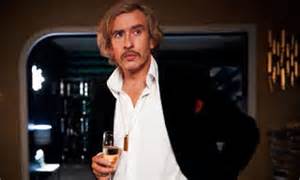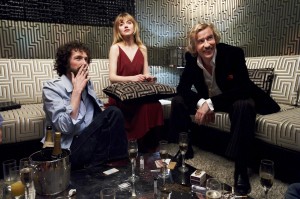 The Look of Love, Michael Winterbottom’s biopic of nightclub owner and porn magnate Paul Raymond, plays it straight; in recreating the rise of an entrepreneur. Winterbottom and writer, Matt Greenhalgh, don’t take sides on an eventful life of excess. That’s a good thing, but with the lack of analysis comes a lack of depth.
The Look of Love, Michael Winterbottom’s biopic of nightclub owner and porn magnate Paul Raymond, plays it straight; in recreating the rise of an entrepreneur. Winterbottom and writer, Matt Greenhalgh, don’t take sides on an eventful life of excess. That’s a good thing, but with the lack of analysis comes a lack of depth.
Much of the film’s content is repetitive, seemingly mirroring Raymond’s life. While there are recreations of TV documentaries and montages of porn-mag shoots incorporated into his ascent, much of the first half consists of different London stage shows being established. From an early effort in which topless women escape from a lion in a cage to nude women swimming in a glass tank while a token drama plays out to the left, Winterbottom captures the laughably tacky nature of Raymond’s entertainments.
‘The King of Soho’ (also the film’s working title) is played by regular Winterbottom collaborator Steve Coogan, and it’s hard to avoid comparisons with the actor’s most famous creation. The script plays on this: “Bottoms up…literally” while watching naked women with snakes over a drink is one of Raymond’s many Alan Partridge-esque double entendres in a script packed with deliberately bad jokes.
But Coogan is compelling, and these upbeat, playful scenes are shot through with melancholy due to the occasional switch to Raymond in his later years, reflecting on an event suggested within the opening minutes. It is here that he, and the film, comes closest to analysis: scenes of Raymond watching old TV programmes about himself and daughter Debbie (Imogen Poots) show a man reflecting ruefully on his life. The decision to signpost this at the start is a good one, for it gives the implication that there is more to him – at least when he’s older – than it seems in most of the film. But it never does more than imply; the only sense we get that he is anything other than content with what he has done is with those close-ups of his face. It’s left to us to decide what they represent.
 Raymond is happy with the wealth and notoriety he has earned, but aside from telling his daughter (and granddaughter) that he’s doing what he does partly for their wellbeing, there’s no indication that he thinks about what he is producing or why – or whether he cares about his cheating. He doesn’t, as far as we know, lie to his wife Jean (Anna Friel) or later partner Fiona (Tamsin Egerton), or at least not for long. Is his cockiness a façade? We come out knowing what happened, but not why his life mattered to him and others who were part of it.
Raymond is happy with the wealth and notoriety he has earned, but aside from telling his daughter (and granddaughter) that he’s doing what he does partly for their wellbeing, there’s no indication that he thinks about what he is producing or why – or whether he cares about his cheating. He doesn’t, as far as we know, lie to his wife Jean (Anna Friel) or later partner Fiona (Tamsin Egerton), or at least not for long. Is his cockiness a façade? We come out knowing what happened, but not why his life mattered to him and others who were part of it.
Raymond’s estranged son, upon meeting his father for the first time in years, shows a photograph of his mother. Raymond’s response is that she was a very good looking woman. Whether he has nothing more positive to say about his ex-wife or whether that is his limit when it comes to thinking – or at least expressing his thoughts – about women is unknowable; although afterwards, when he puns on his daughter’s breast size in a speech at her wedding, it’s hard not to conclude it’s nearer the latter.
In shying away from offering any insight into Raymond’s psyche the film seems oddly incurious. Or perhaps he really was that one-dimensional.




